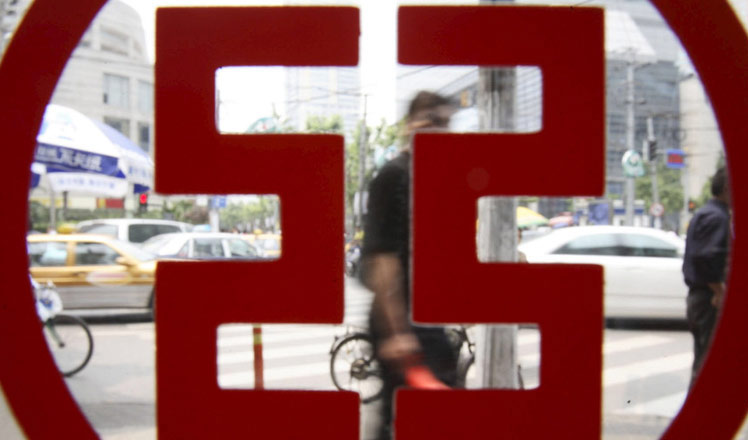Baosteel moves toward a greener future
Updated: 2016-08-26 22:55
By WANG YING in Shanghai(China Daily USA)
|
|||||||||
Baoshan Iron and Steel Co, one of China’s largest steelmakers, recently announced that it would significantly reduce its capacity as part of its efforts to become an urban steel maker that produces lesser emissions.
“Baosteel has made a thorough analysis on our resources, markets, products and production lines and have decided to cut the group’s capacity by 9.2 million tons between 2016 and 2018. The decision is in line with State-owned enterprises’ goal and requirement to alleviate the overcapacity of the steel industry,” said Chen Derong, president of Shanghai Baosteel Group Corp.
For years, steel manufacturing has earned itself a reputation for being an industry with high levels of resource consumption, emission and pollution. As a result, Baosteel has for the past few years been striving to transform itself into an urban steel maker that uses smart manufacturing and an internet-based ecosystem to manage its operations in areas such as logistics, delivery and financing in a more environmentally friendly manner.
The company has also invested much effort into the development of environment-related technology. For instance, Baosteel is currently capable of turning 8,000 tons of used paint buckets into high-quality raw materials for steel manufacturing. Baosteel has also identified how the e-commerce phenomenon in China has resulted in vast amounts of packaging materials being discarded after consumers receive their online shopping orders, and is currently researching how these materials can be turned into blast furnace fuel.
In September, 2015, Baosteel commenced operations of a green steel project in Zhanjiang, Guangdong province, marking a milestone for the Shanghai-based steelmaker and China’s steel industry.
“With more than 6 billion yuan ($903 million) investment going into this energy-saving project, the Zhanjiang project will become a green steel manufacturing base with the least emissions and highest energy and resources efficiency,” said Guo Bin, deputy general manager of Baosteel Group.
During the release of the eighth edition of the Baosteel Group Corp Social Responsibility report, Chen said the group’s capacity reduction will also aid Shanghai’s transformation into an international economic center, a financial center, a trade center and a shipping center by 2020.
Last year, China’s steel industry saw its first negative growth in 34 years, with crude steel output falling 2.3 percent from that of the previous year, according to statistics from Shanghai Ganglian Ecommerce Holdings Co Ltd.
Data from the China Iron and Steel Association also showed that major steel enterprises reported a total loss of 64.5 billion yuan in 2015, a sharp fall from the 22.6 billion yuan profits a year ago. In addition, more than half of the steel makers in the country were in the red, and their monthly losses from August to December 2015 hit 10 billion yuan.
“Baosteel is not immune to the industrial cool down and the past year has been the most challenging one in Baosteel’s 30 year history,” said Chen.
wang_ying@chinadaily.com.cn
- Bolivian deputy interior minister killed by miners: report
- In photos: Great Dorset Steam Fair 2016
- Historical towns before and after Italy's earthquake
- Car bomb kills at least eight at police headquarters in Turkey
- Brazil's Senate begins Rousseff's impeachment trial
- Arts festival aims to unite cultures

 World's top 10 largest banks by assets
World's top 10 largest banks by assets
 Sand sculptures to welcome the G20 Summit
Sand sculptures to welcome the G20 Summit
 Historical towns before and after Italy's earthquake
Historical towns before and after Italy's earthquake
 College prepares 300 sleeping mats for parents
College prepares 300 sleeping mats for parents
 Ten photos from around China: Aug 19 – 25
Ten photos from around China: Aug 19 – 25
 Top 5 fitness bands in customer satisfaction
Top 5 fitness bands in customer satisfaction
 Orangutan goes shopping in Southwest China
Orangutan goes shopping in Southwest China
 Prince William and Kate visit charity orgarnization
Prince William and Kate visit charity orgarnization
Most Viewed
Editor's Picks

|

|

|

|

|

|
Today's Top News
Trump outlines anti-terror plan, proposing extreme vetting for immigrants
Phelps puts spotlight on cupping
US launches airstrikes against IS targets in Libya's Sirte
Ministry slams US-Korean THAAD deployment
Two police officers shot at protest in Dallas
Abe's blame game reveals his policies failing to get results
Ending wildlife trafficking must be policy priority in Asia
Effects of supply-side reform take time to be seen
US Weekly

|

|









